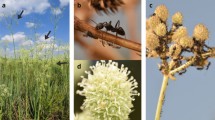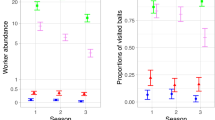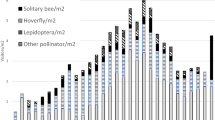Summary.
Oviposition site selection of herbivorous insects depends primarily on host plant presence which is essential for offspring survival. However, parasitoids can exploit host plant cues for host location. In this study, we hypothesised that herbivores can solve this dilemma by ovipositing within high plant diversity. A diverse plant species composition might represent an ‘infochemical shelter’, as a potentially complex volatile blend can negatively affect the host location ability of parasitoids. We examined this exemplarily for the egg-laying response of the generalist leaf beetle, Galeruca tanaceti, in relation to (1) host plant availability and (2) plant species diversity in the field. Further, we investigated the effect of odours from mixed plant species compositions on (3) leaf beetle oviposition site selection and on (4) the orientation of its specialised egg parasitoid, Oomyzus galerucivorus. In the field, egg clutch occurrence was positively related to the presence and quantity of two major host plants, Achillea millefolium (yarrow) and Centaurea jacea, and to the number of herbaceous plant species. In two-choice bioassays, female beetles oviposited more frequently on sites surrounded by an odour blend from a diverse plant species composition (including yarrow) than on sites with a pure grass odour blend. In the presence of yarrow odour and an odour blend from a diverse plant mixture (including yarrow) no difference in the oviposition response was recorded. Experienced parasitoid females were attracted to yarrow odours, but showed no response when yarrow odours were offered simultaneously with odours of a non-host plant. In conclusion, it could be shown in laboratory bioassays that the parasitoid responds only to pure host plant odours but not to complex odour blends. In contrast, the herbivore prefers to oviposit within diverse vegetation in the field and in the laboratory. However, the laboratory results also point to a priority of host plant availability over the selection of a potential ‘infochemical shelter’ for oviposition due to high plant diversity.
Similar content being viewed by others
Author information
Authors and Affiliations
Corresponding author
Rights and permissions
About this article
Cite this article
Randlkofer, B., Obermaier, E. & Meiners, T. Mother’s choice of the oviposition site: balancing risk of egg parasitism and need of food supply for the progeny with an infochemical shelter?. Chemoecology 17, 177–186 (2007). https://doi.org/10.1007/s00049-007-0377-9
Received:
Accepted:
Issue Date:
DOI: https://doi.org/10.1007/s00049-007-0377-9




